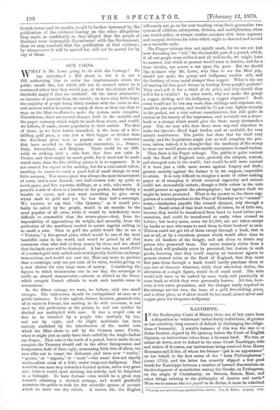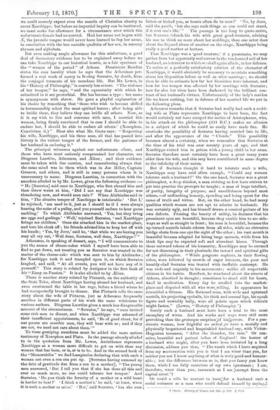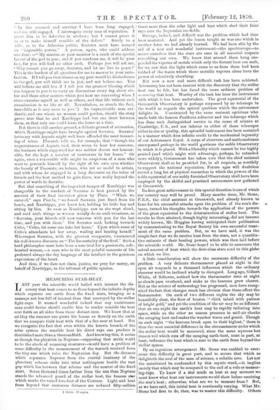XANTHIPPE.
IN the Bankruptcy Court of History there has of late years been a disposition to' whitewash' rather freely individuals, of greater or less notoriety, long accused of default in discharging the obliga- tions of humanity. A notable instance of this was the case in re Judas Iscariot, argued by De Quincey before the Court of English Opinion, on instructions taken from a German brief. We rise, or rather sit down, now to defend in the same Court Xanthippe, wife and widow of Socrates, our instructions being received from Herrn Heumann and Zeller, of whom the former "put in an appearance" on her behalf, in the first series of the " Acta Philosophorum " (anno 1715), and the latter has recently slipped a few good words for Xanthippe between a number of learned dissertations on the development of monotheism among the Greeks, on Pythagoras, on the origin of Christianity, on Strauss, Renan, Baur, and other things relating to the philosophy of heaven and earth.* Were we to assume the ear populi to be divine, it must be admitted *Vortrage and Abhandlungen geschichtlichen Inhcets. Von E. Zeller. Leipzig. WI.
we could scarcely expect even the mantle of Christian charity to cover Xanthippe; but before an impartial inquiry can be instituted, we must make due allowance for a circumstance over which this unfortunate female had no control. Had her name not begun with X, the juvenile tongue would never have learned to lisp her name, in association with the less amiable qualities of her sex, in nursery rhymes and alphabets.
But even making ample allowance for this misfortune, a good deal of damnatory evidence has to be explained away before we can take Xanthippe to our historical hearts, as a fair specimen of the " women of the period " of Athens. Dominicus Baudius states the case harshly when he says that the Athenians per- formed a real work of mercy in free-ing Socrates, by death, from the conjugal torments of his mundane life. But Mr. Lewes, in his "History of Philosophy," is scarcely less severe. "The violence of her temper," he says, " and the equanimity with which he submitted to it are proverbial. She has become a type ; her name is synonymous with shrew. He gave a playful explanation of his choice by remarking that ' those who wish to become skilled in horsemanship select the most spirited horses; after being able to bridle these, they believe they can bridle all others. Now, as it is my wish to live and converse with men, I married this woman, being firmly convinced that in case I should be able to endure her, I should be able to endure all others.' (Xenophon, Convivium ii.) " Hear also what Mr. Grote says " Respecting his wife, Xanthippe, and his three sous, all that has passed into history is the violent temper of the former, and the patience of her husband in enduring it."
The principal witnesses against our unfortunate client, and those who have most seriously compromised her character, are Diogeues Laertius, Athenians, and Alien; and their evidence must be taken with due caution, and remembering always that the same mind was in them which was in Joe Miller, Captain Gronow, and others, and is still in many persons whom it is unnecessary to name. Diogenes Laertius, in connection with the anecdote alluded to by Mr. Lewes, gives the following evidence :- +' He [Socrates] said once to Xanthippe, who first abused him and then threw water at him, ' Did I not say that Xanthippe was thundering now, and would soon rain ?' When Alcibiades said to him, ' The abusive temper of Xanthippe is intolerable.' But I,' he rejoined, am used to it, just as I should be if I were always hearing the noise of a pulley, and you yourself endure to hear geese cackling.' To which Alcibiades answered, Yes, but they bring sue eggs and goslings.' Well,' rejoined Socrates, ' and Xanthippe brings me children' Once she attacked him in the market-place, and tore his cloak off ; his friends advised him to keep her off with his hands ; ' Yes, by Jove,' said he, that while we are boxing you may all cry out, Well done, Socrates, well done, Xanthippe I' " Athenmus, in speaking of dessert, says, "I will communicate to you the names of cheese-cakes which I myself have been able to find to put down, not treating you as Socrates was treated in the matter of the cheese-cake which was sent to him by Alcibiades ; for Xanthippe took it and trampled upon it, on which Socrates laughed, and said, " At all events, you will not have any of it yourself." This story is related by Antipater in the first book of his "Essay on Passion." It is also alluded to by Alien.
There is another story related by Plutarch, on the authority of the Stoic Teles, about Xanthippe having abused her husband, and even overturned the table in her rage, before a friend whom he had nuexpectedly brought to dinner. But Plutarch tells the same story about the wife of Pittacus, just as Athenmus frequently ascribes in different parts of his work the same witticisms to various authors. Diogenes Laertius gives a much less disagreeable account of the circumstance. "Socrates," he says, "once invited some rich men to dinner, and when Xanthippe was ashamed of their insufficient appointments, he said, ' Be of good cheer, for if our guests are sensible men, they will bear with us ; and if they are not, we need not care about them."
To these gossiping anecdotes must be added the more serious testimony of Xenophon and Plato. In the passage already alluded to in the quotation from Mr. Lewes, Antisthenes represents Xanthippe as a woman more difficult to get on with than any woman that has been, or is, or is to be. And in the second book of the "Memorabilia" we find Lampiocles declaring that with such a woman not even a son can put up. [Socrates having summed up the debt of gratitude due from a son to a mother], "The young men answered, But I tell you that if she has done all this and ever so much more, no one could tolerate her temper.' And Socrates, 'Do you think the ferocity of a mother or a wild beast is harder to bear I think a mother's,' he said, at least, when it is such a mother as mice.' But,' said Socrates, ' has she ever bitten or kicked you, as beasts often do to men?' No, by Jove, said the youth, but she says such things as one could not stand, if it cost one's life.' " The passage is too long to quote entire, but Socrates defends his wife with great good-humour, advising his son to think no more about her scoldiugs, than one actor does about the feigned abuse of another on the stage, Xauthippe being really a good mother at bottom, That Xanthippe was a 'good creature,' if a passionate, we may gather from her apparently real sorrow in the condemned cell of her husband, an interview to which we shall again allude, in her defence. To arrive at a perfectly satisfactory solution of the character of Xanthippe, it would obviously be necessary to ascertain something about her disposition before as well as after marriage ; we should then be able to estimate how far her blemishes were inherent, and how far her temper was affected by her marriage with Socrates ; how far also her vices have been darkened by the brilliant con- trast of her husband's virtues. Unfortunately of the lady's maiden life we know nothing, but in defence of her married life we put in the following pleas.
Athenmus remarks that if Socrates had really had such a scold- ing wife as Plato represents Xanthippe to have been, the fact would certainly not have escaped the notice of Aristophanes, who, in his attack on the philosopher (424 B.C.) makes no allusion to a subject of which he could so easily have made fun. He overlooks the possibility of Socrates having married late in life, and after the appearance of the " Clouds." This possibility becomes almost a certainty, when we remember that Socrates at the time of his trial was over seventy years of age, and that Xanthippe visited him in prison with a young child iii her arms. Socrates therefore must certainly have been a great many years older than his wife, and this may have contributed in some degree to the infelicity of their uni6n.
But if Socrates thought it hard to tolerate such a wife, Xanthippe may have said often enough, " Could any woman tolerate such a husband?" On the one hand, Socrates was a great philosopher, a• deep thinker, a man striving as few have striven to put into practice the precepts he taught ; a man of huge intellect, of purity, integrity of purpose, and unselfishness beyond most others,—of unflinching honesty, spending and being spent for the cause of truth and virtue. But, on the other baud, he had many qualities which women are not apt to admire in husbands. He was certainly ugly, and has himself drawn a comical picture of his own defects. Praising the beauty of utility, he declares that his prominent eyes are beautiful, because they enable him to see side- ways as well as straight in front ; his nose is beautiful, because the up-turned nostrils inhale odours from all sides, while no obtrusive bridge shuts from one eye the sight of 'the other ; his vast mouth is beautiful because adapted for biting large morsels, while from his thick lips may be expected soft and abundant kisses. Through these outward tokens of his humanity, Xanthippe may be excused for not discerning in their plenitude the inward and spiritual gifts of the philosopher. " While gorgeous sophists, is their flowing robes, were followed by crowds of eager listeners, the poor and humbly-clad Socrates was treated with ineffable contempt. He was rude and ungainly in his movements ; unlike all respectable citizens in his habits. Barefoot, he wandered about the streets of Athens, absorbed in thought ; sometimes he stood still for hours, fixed in meditation. Every day he strolled into the market- place and disputed with all who were;willing. In appearance he resembled a Silenus. His flattened nose, with wide and upturned nostrils, his projecting eyeballs, his thick and sensual lips, his squab figure and unwieldy belly, were all points upon which ridicule might fasten." (Lewes, " History of Philosophy.") Surely such a husband must have been a trial to the most exemplary of wives. And his works and ways were still more provoking than the grotesque surprises of hislperson. For a pas- sionate woman, how frightful an ordeal to have a morally and physically bespattered and besprinkled husband say, with Victor- Hugonian terseness, " After the thunder, the rain." Or con- ceive, beautiful and patient ladies of England the horror of a husband who might, after you have been irritated by a long discussion, address you thus, " The result which I have acquired from my conversation with you is that I am wiser than you, for neither you nor I know anything of what is truly good and honour- able ; but the difference between us is, that you fancy you know them, while I am fully conscious of my own ignorance ; I am, therefore, wiser than you, inasmuch as I an► :exempt from the capital error."t
Or could a wife be content to have;for a husband such .a social nuisance as a man who could defend himself by saying,t Grote. History of Greece, vol, viii, p. 56S. j Ibid.
" In this research and scrutiny I have been long engaged, aad am still engaged. I interrogate every man of reputation. I prove him to be defective in wisdom ; but I cannot prove it so as to make himself sensible of the defect." Surely to a wife, as to the Athenian public, Socrates must have seemed an "impossible person." A person, again, who could address one thus: —" My mission as your monitor is a mark of the special favour of the god to you ; and if you condemn me, it will be your loss, for you will find no other such. Perhaps you will ask me,
Why cannot you go away, Socrates, and let me live in peace ?' This is the hardest of all questions for me to answer to your satis- faction. If I tell you that silence on my part would be disobedience to the god, you will think me in jest, and not believe me. You will believe me still less if I tell you the greatest blessing which can happen to you is to carry on discussions every day about vir- tue and those other matters which you hear me canvassing when I cross-examine myself as well as others, and that life without such examination is no life at all. Nevertheless, so stands the fact, incredible as it may seem to you."§ An impracticable man evi- dently, and one whom no woman could pardon, should the story prove true that he and Xanthippe had but one dress between them, so that only one could leave the house at a time.
But there is still another ground, a delicate ground of accusation, which Xanthippe might have brought against Socrates. Socrates' intimacy with Aspasia might well have offended the most inexact- ing of wives. Plutarch tells us, for example, that "though the acquaintances of Aspasia took their wives to hear her converse, the business which supported her was neither decent nor honour- able, for she kept a number of courtezans in her house." Or again, even a reasonable wife might be suspicious of a man who went to persuade himself by the sight of his own eyes whether the beauty of Theonote, an hetmra, who sat as model to artists, and with whom he engaged in a long discourse on the value of friends and the best method to gain them, was really beyond the power of words to describe.
But that something of the imperfect temper of Xanthippe was chargeable to the conduct of Socrates is best proved by the account of their final interview given by Plato. " When we entered," says Pine lo, " we found Socrates just freed from his bonds, and Xanthippe, you know her, holding his little boy and sitting by him. As soon as Xanthippe saw us she wept aloud, and said such things as women usually do on such occasions, as Socrates, your friends will now converse with you for the last time, and you with them.' But Socrates said, looking towards Crito, Crito, let some one take her home.' Upon which some of Crito's attendants led her away, wailing and beating herself." Whereupon Socrates, with the greatest composure, commenced his well-known discourse on " The Immortality of the Soul." Such a hard philosopher must have been a sore trial for a passionate, soft- hearted woman,—a man who in the most painful moments of life preferred always the dry language of the intellect to the generous expressions of the heart.
And thus, if we dare not claim justice, we pray for mercy, on behalf of Xanthippe, to the tribunal of public opinion.




































 Previous page
Previous page